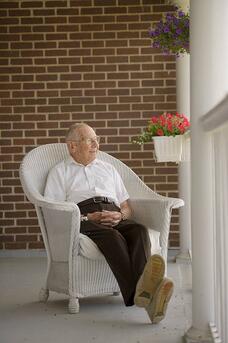By Jim Stinson, Director of Spiritual Life for UMH
Life and Loss…
 Frank Bruni, a columnist for the New York Times, in response to a professor who was fond of observing that “life is about learning to deal with loss,” says the professor was only half right.
Frank Bruni, a columnist for the New York Times, in response to a professor who was fond of observing that “life is about learning to deal with loss,” says the professor was only half right.
In his column reflecting on maturity, Bruni agrees that loss is an inherent part of life for which skills of coping must be learned. However, he observes, “Life is about learning to look past what’s lost to what’s found in the process.” At least, he notes, maturity is about that kind of learning. Unwittingly, perhaps, he led me back to Henri Nouwen’s, The Wounded Healer, in which Nouwen says it is the losses and wounds of life that enable empathetic responses to people in distress of any kind.
Those observations are worth remembering as we think about our own lives. We have all faced losses and have usually learned to look past them and discovered new life. We have learned lessons in acceptance and patience. We have wisdom to share regarding coping skills. We are often are more mature in wisdom than younger people are. We have lived longer, experienced more and developed more coping skills.
A Complicated Decision
It was serendipitous that I should read Bruni’s article after an eventful day at our Bishop Wicke Health and Rehabilitation Center. As I was preparing to leave for the weekend, a woman approached me and asked if I had time to meet with her and her family. “Mom” is currently receiving care at Bishop Wicke. Currently she is in precarious health.
Complicating the family situation is that Dad is also seriously ill and their brother died recently. “Mom doesn’t know these things yet and we don’t think we should tell her. Do you think we’re correct in not telling her?” Certainly a question that raises other questions! I did not envy that family, nor did I suggest an answer, other than saying it had to be their choice, all the while hoping they could live with the consequences of whatever decision they made.
Maturity in Action
That same evening I was called back to Bishop Wicke to see another resident. Her niece, by marriage, to whom she had become a ‘second’ mother, had died unexpectedly. She too is in precarious health, is older and has had many losses in her life. Her daughter had decided to tell her the news, which is when I was called in.
With the wisdom born of experience she shared her tears and pain and then said calmly and faithfully, “She’s with God now. I’ll do what I’ve learned to do. I’ll trust it to Him and I’ll get on with my life.” The ‘wounded healer’ was healing those around her (the nurse who had sent for me, the daughter who gave her the news, and myself, who had wondered what to say to her), even as she was allowing herself to begin the healing process. The wisdom of experience had taught her she could deal with whatever came to her, and was teaching others as well. We were witnessing maturity in action!
The Real Gifts of Aging
This sequence of events led me to an ever-dawning awareness of one of the real gifts of aging. It is insight born of experience of loss. It is a reminder that maturity, which only comes with experience, is the gift older people have. So when you wonder if there is real value in aging, wonder again at the gift you have to offer. Examples of maturity are needed all around us! Share yours with others. Let others learn from it; you’ll feel good about it, and it will reassure you of your importance.
Key Takeaways
- We all must learn to deal with loss, but much can be gained in the process.
- Dealing with loss is often the center of many of life’s most difficult moments.
- The wisdom of experience teaches us we can deal with whatever comes along.
- The real gifts of aging are the insight born of experience of loss and the maturity which only comes with experience.
- Encourage older adults to share the gift of maturity with those around them.

